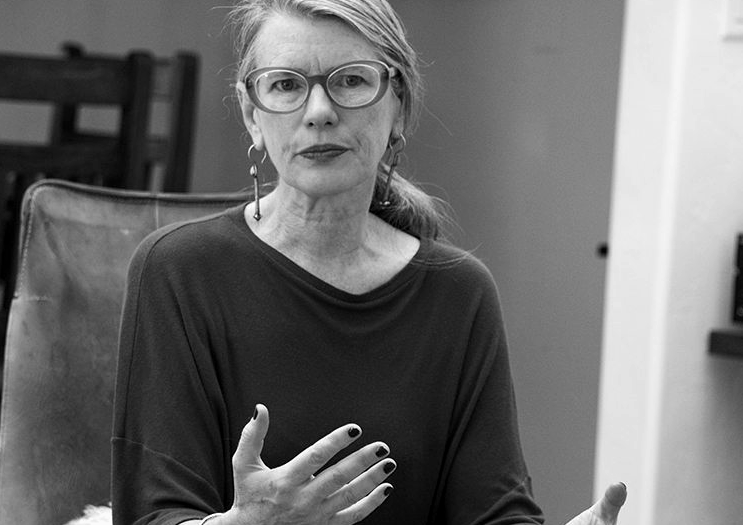
Lisa Robertson and I were introduced through my dear friend Marnie Slater following an invitation by Autumn Royal to undertake an interview for Cordite Poetry Review. I felt the need to be completely transparent with Lisa in stating that I’m artist working in moving image, that I’m not a writer by trade, and neither an expert on Lisa’s work. In fact, it was Marnie who introduced me to Lisa’s poetry, inviting me to a reading Lisa gave in Brussels in 2017. After this I bought three of her books at once, yet somehow, I found myself reading them slowly, over long durations of time and with some loyalty in finishing one publication before starting another. I felt curious about my own time with these publications, how in my focused and durational readings began to inform my life and thinking.
After exchanging a few emails, Lisa and I spoke for a number of hours via Skype on 26 February 2020. We had agreed that our dialogue would be fleshed out through a written exchange. My first reflections after our Skype conversation were posed to Lisa on 1 March. The time which separated our initial contact and my first written reflections and then eventually, her responses, was radically re-negotiated by the outbreak of the COVID-19 virus. During this time, Lisa was travelling in Vancouver, slowly cancelling the other parts of a West Coast book tour as we all learned about the gravity of the pandemic. Then she flew home to France early, in time for lockdown there. As a result of these shifting circumstances, and our email exchanges about our own changes in space and time – we have decided to date each portion of our writing as they have been added to or cut into the existing body of the text. Please be aware there is a lack of linearity to this exchange, which may reflect on how conversations and exchanges actually occur. As Lisa writes in ‘The Seam’ from 3 Summers1: ‘Now it’s time to return to the sex of my thinking. / How long do I get? / A fly moves across the pages of an open book / (the pages are quivering)’.
Elena Betros López (1 March 2020): References to time kept arising whilst I was revising my notes from our conversation. I found this striking especially as I raised my own time with your poetry in my initial email to Marnie. How I felt I could not put down Magenta Soul Whip2 which I started in 2017 until 2019 when I began reading 3 Summers. These books have held different temporalities for me, yet each is read very slowly and with much re-reading or re-visiting, I feel some fidelity to each publication in that I find it hard (in an embodied sense) to move onto another until I’m ‘done’ with the one I am reading.
I didn’t really arrive at any specific questions, I tried but it felt too forced. Through revising my notes, I gathered a number of fragments we spoke about which felt most pertinent to me. I’m wondering if you could build on these reflections and we can work from here?
EBL (5 March 2020): A quick note to say that our initial musings and writing on time seem striking in view of the present circumstances. My writing the questions before this present moment of time, the COVID-19 time, which feels to me to hold a special temporality, then your responses after. I have been feeling like the future has been suspended in this time of the pandemic. I’ve placed the dates on my questions and your responses. I think it is interesting at least for now to chart the subjective and embodied shift with this dating, as well as to mark my recent questions cutting into your existing responses.
EBL (1 March 2020): During our Skype conversation we spoke about the type of slow time you need to write, its tension within or maybe resistance to the neo-liberal colonisation of time. You mentioned that your methods were developed in a different political economy yet have been carried forward. Later asking the question: ‘How to create language that gives experience as much time as it needs?’
Lisa Robertson (22 March 2020): I don’t have a certain answer to this question. I think it will continue to change, happily, and is also very situational. My experience as a worker, a composer, and thinker in language keeps showing me, in diverse ways, that language itself (here by ‘itself’ I don’t mean an ideal, desituated language, but each specific experience in language, each shock we receive in its company) is already a constantly mutating temporal record and organism. In the experience of language we are multiple, outside ourselves. The challenge in writing, reading, and of course oral exchange, could be to slow down, or to learn how to frame one’s linguistic perception, so that the micro events and traces inherent to both our vocabularies and syntax become conscious. Within this alerted consciousness, more kinds of responses and movements and celebrations and critiques become possible. Speed is also a pleasure, clearly – slowness won’t be relevant consistently – but play, contemplation, mixture and experimentation with tempo, in composition, or in reception, and in their entanglement, is a way to begin to individually resist capital’s reduction of public discourse to a utilitarian exchange with the end goal of consumption. The neo-liberal political economy proceeds by the rule of austerity, or collective limitation. I utterly scorn this law. I am in favour of abundance, whether temporal, aesthetic or social. We can create abundance for each other. That’s one of the gifts of poetry.









